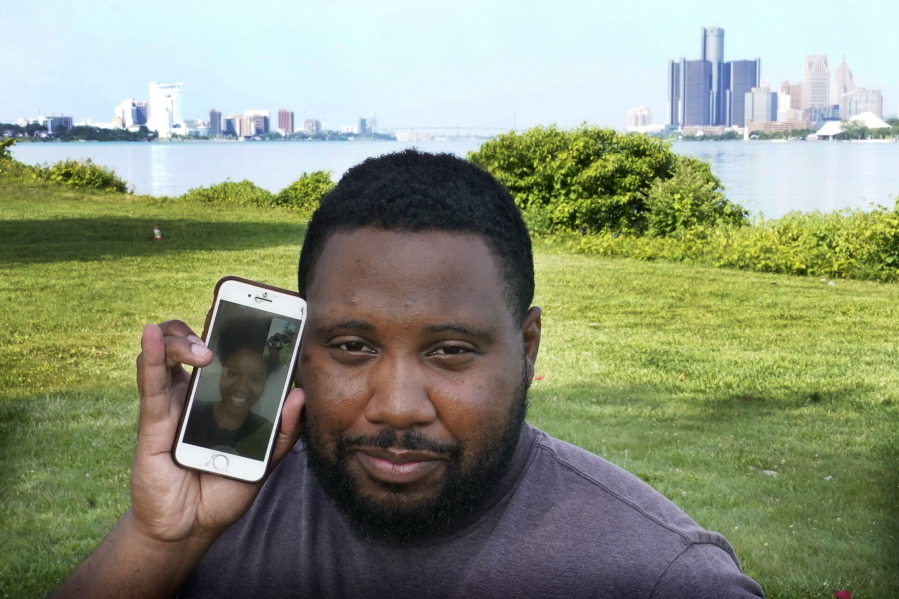NEW YORK — Quintin Sweat and Renée Harrison live only 15 minutes apart by car, with the U.S.-Canada border between them.
But the couple, who got engaged in 2019, has only been able to be together three times during the pandemic. Travel restrictions mean Harrison must drive four hours from her Windsor, Ontario home to the Toronto airport in order to fly to Detroit where Sweat lives. For Sweat, it means a mandated two-week stay in Canada.
The two even drove to the outer limits of their respective borders just to see each other but they were still so far away that they “looked like dots,” Sweat said.
“She’s gone to the edge of Windsor and I’ve gone to the edge of Detroit and we can see each other, but we can’t actually be with each other,” he said. They have delayed their wedding to 2022.
Since the start of the pandemic, a constantly changing and confusing web of travel restrictions have separated loved ones around the world. For people whose lives cross international borders and for immigrants who leave their homes behind to move to a new country, not knowing when they can see their relatives again compounds the pain of separation.
For Sweat and Harrison, there is some relief in sight when Canada begins letting in fully vaccinated Americans Monday. Harrison still can’t drive in to Detroit, however, as the U.S. is restricting entry by car from Canada and Mexico until at least Aug. 21.
The U.S. still bars travelers from specific countries — Brazil, China, India, Iran, South Africa and much of Europe. The European Union recommended allowing in U.S. travelers in June, although individual European countries make their own rules. Britain opened its borders to fully vaccinated travelers from the U.S. and the European Union on Monday.
The U.S. airline lobby is pushing the U.S. government to reopen travel with “low-risk countries,” and European officials have pressed their case as well. But a White House official said July 26 that the U.S. will keep existing international travel restrictions in place for now because of surging infection rates due to the delta variant.
Alyson Sicard, who lives in Tampa, Fla., with her husband, who is on a research visa, lost a relative to suicide several weeks ago and her father got married in June. She has not been able to return to her home in France for any of it because of the U.S. travel restrictions.
“My neighbor can go to my father’s wedding but I cannot,” Sicard said. “I told her, go there. And take pictures for me.”
For some immigrants, it’s the countries they left that are keeping them out now. Some countries have shut their borders for the entirety of the pandemic, like Australia. Others closed their borders, reopened them, and closed them again.
Imelda Norton, who lives in Denton, Texas, hasn’t seen her mother, brothers and their families, who live in the Riau province of Indonesia, since 2016. She was supposed to go in 2020 but that was spiked because of the pandemic. Now it’s unclear when she’ll get another chance. Indonesia’s borders are largely closed, and COVID cases there have surged.
“I told my mom, you know, please take care of yourselves, if anything happened to any of you, I can’t really go,” she said.
Travel restrictions aim to stop populations from mixing in order to slow the spread of the virus. It’s not a long term solution and ultimately the only fix is global distribution of vaccines, said Wilbur Chen, a professor at the University of Maryland who specializes in vaccines.
There is a debate among public health experts about how and when to restrict travel during a pandemic, said Jennifer Nuzzo, a Johns Hopkins University public health researcher. It’s been difficult to control COVID-19 even with travel bans in place, she said.
“I don’t yet see compelling data saying yes, travel restrictions worked, except for maybe a few examples,” such as New Zealand, she said.
Some travel restrictions may be circumvented by some people with the extra time and money to do so. Michelle Lariviere, who lives in a village about 45 minutes from London, flew to Croatia at the end of July, staying in a hotel there for two weeks, and then going to New York, because Croatia isn’t on the U.S.’s list of restricted countries while the U.K. is.




